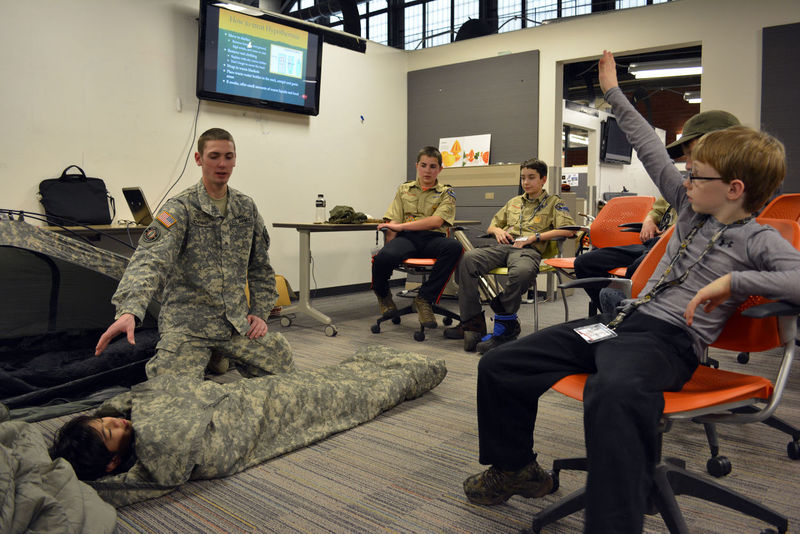
By Kelly McGowan
An Eagle Scout and ROTC cadet led nearly 300 Boy Scouts in the Scout Oath on the Armory bleachers Jan. 24.
“On my honor, I will do my best to do my duty to God and my country,” said Benjamin Brixius, junior in kinesiology and health. He recited the oath to start the 28th annual Boy Scout Winter Survival Training hosted by ROTC cadets at Iowa State.
Teams of cadets volunteered to teach courses, as 12 to 17-year-old scouts rotated through. Classes in the Armory covered land navigation, signaling, first aid and personal hygiene. Outdoor classes in Pammel Woods covered fire and shelter building and water and food procurement. Sparse snow and a 48-degree high made for a different training than previous years.
Todd Eipperle, a first sergeant of military intelligence in the National Guard and field director for the Mid Iowa Council for the Boy Scouts of America, saw the benefits that scouting provided during his deployment to Iraq in 2003 and works to share those benefits with young scouts.
Seeing Brixius lead the event showed the scouts an example of what they could do in the future, Eipperle said.
Boy Scouts follows a military structure and many ROTC cadets are former scouts. Around 11 ISU cadets reached the rank of Eagle Scout.
Cadet Matthew Kelly, sophomore in chemistry, is one of them. He joined at age 15. This is later than most scouts, but he saw that being an Eagle Scout would help with an ROTC scholarship and joined.
Kelly got the scout rank on his first day and reached Eagle Scout in one year and seven months. This designation requires involvement and service in a scouting unit for six months, demonstrated adherence to the Scout Oath and Scout Law, 21 merit badges, a service project, a unit leader’s conference and completion of the Eagle Scout board of review.
“When we come out and introduce ourselves as Eagle Scouts, you can see their eyes get real big,” Kelly said. “Wearing this uniform, they look up to us as role models and as leaders and I think that’s just something incredible.”
He taught scouts about finding food in the wilderness.
“You never know when you’re going to get stuck in a survival situation,” Kelly said
Joshua Smith, leader of Troop 346 in Jasper County, came to this training at Iowa State when he was a Boy Scout more than 10 years ago. On Jan. 24, he came with his son and troop.
He said they learn winter skills that are important to have in Iowa’s climate.
“The Boy Scouts teach a lot of important things they won’t learn in school,” he said. “It covers more than campfires and tents.”
His son, a 12-year-old also named Joshua Smith, said he would feel more confident if he were to get lost on a campout after this training. He is interested in ROTC and Iowa State, and appreciated getting to know the cadets, he said.
“They’re really nice and I really like them and hopefully someday I might become one of them,” 12-year-old Joshua Smith said. “I think it would be really cool that maybe one day I’ll be the one teaching to help all the other scouts”
Lt. Col. Richard Smith, professor and chairman of the military science and tactics department, said the boys are at the age to decide whether or not to continue with Boy Scouts.
“Whether it’s cars or girls or sports,” Richard Smith said, “it’s a distraction for a younger guy.”
Participating in this training helps them see what Boy Scouts could help them achieve, he said.
Kyle Simpson, senior in history, has volunteered for the event for three years and sees the scouts look up to cadets.
“They see a uniform and they don’t know the difference between a regular soldier and a cadet,” Simpson said. “They see us as the same guys that are overseas fighting wars and doing all sorts of things like that. To them, a lot of us are heroes.”
He said this spurs questions like whether the military is like Call of Duty.
“When they grow up,” he said, “they’ll understand a lot better it’s not all about shooting guns.”
Fletcher Hopkins, junior in kinesiology and health, said he hoped the scouts left with a more realistic vision of the military.
“It looks absolutely nothing like it does in the movies,” Hopkins said.